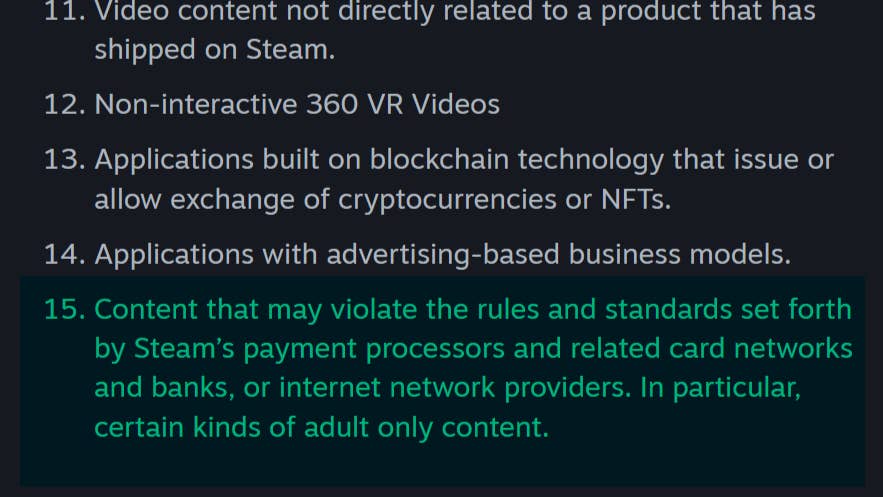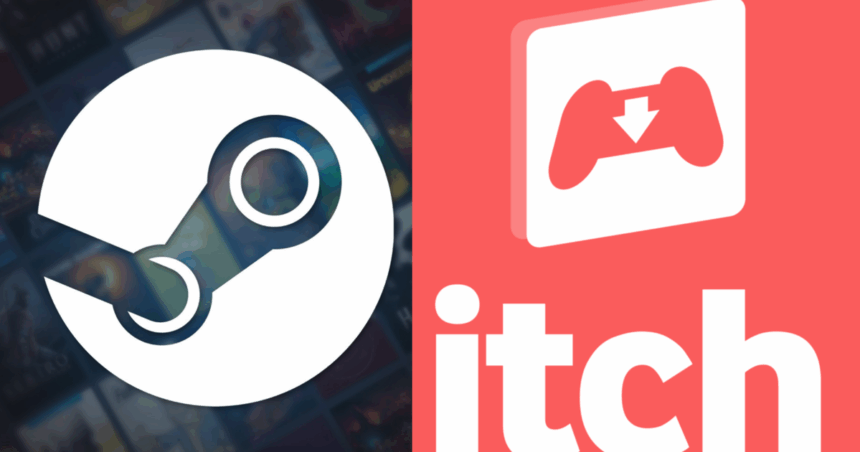“The situation developed rapidly,” said itch.io founder Leaf Corcoran, in what might turn out to be the understatement of the year. Almost overnight, game developers have awoken in a much more censorious atmosphere than the one they’ve grown used to.
The rise of digital distribution has long allowed creators to dictate the content of their games, largely unchallenged by retailers. That’s particularly true on PC. But in recent weeks, Steam has removed hundreds of games, and changed its rules to forbid “certain kinds of adult only content” that may displease its payment processors and banks.
Subsequently, itch.io announced that not-safe-for-work games would be unfindable via its store’s search function. “We had to act urgently to protect the platform’s core payment infrastructure,” said Corcoran.
Amid the resulting confusion and outrage, GamesIndustry.biz hopes to answer a few key questions. How did we get here? Why and how are payment processing companies bending game distributors to their will? And most pertinently: how can game developers prepare for a newly prudish publishing environment?
What happened?
No Mercy. That’s the name of the incest-and-rape-focused game that was geo-blocked in Australia this April, following a campaign by the local pressure group Collective Shout. The group, which stands against “the increasing pornification of culture”, then set its sights on a broader target – hundreds of other games they identified as featuring rape, incest, or child sexual abuse on Steam and itch.io. “We approached payment processors because Steam did not respond to us,” said the group of its latest campaign.
The move was effective. Steam began removing sex-related games it deemed to violate the standards of its payment processors, presenting the choice as a tradeoff in a statement to Rock Paper Shotgun: “We are retiring those games from being sold on the Steam Store, because loss of payment methods would prevent customers from being able to purchase other titles and game content on Steam.”
The following week, itch.io ‘deindexed’ all NSFW games on its platform, citing Collective Shout’s campaign and subsequent scrutiny from its payment processors. “Our ability to process payments is critical for every creator on our platform,” Corcoran said. “To ensure that we can continue to operate and provide a marketplace for all developers, we must prioritize our relationship with our payment partners and take immediate steps towards compliance.”
Corcoran characterised this as a temporary measure, while itch.io conducts an audit of the games on its store – determining which will be permanently removed and which will be allowed to stay in accordance with new compliance measures. Itch.io currently supports sales through Stripe and PayPal, and has said that it is actively seeking partnerships with payment processors more willing to work with the content on its site.
Why have the crackdowns happened?
“When you’re a payment processor, there are certain types of products and services that are just more risky,” says Gil Tov-Ly, CMO of Appcharge, a direct-to-consumer payment platform for mobile game publishers. “Risk costs money.”
“In adult content, there is a disproportionate ratio of fraud, chargebacks, and disputes,” he goes on. “And whenever something doesn’t flow smoothly, that incurs cost. Whenever I need people to answer disputes, that costs me an operational expense.”
It’s this unwanted expense that means, for instance, you’re unlikely to be able to pay at the checkout of a porn website using Mastercard. “The regular payment companies don’t want anything to do with that,” Tov-Ly says. “It’s just too risky, with too much potential brand damage.”
“Today it’s rape games and incest, but tomorrow it could be another lobbying group applying pressure on LGBT games”
Gil Tov-Ly, Appcharge
It’s possible that Collective Shout’s campaign highlighted a level of operational and reputational risk that payment processors weren’t aware of, and of a severity they didn’t expect. “I’m guessing it’s also the moral element,” Tov-Ly says. “It just makes sense, right? Why would you condone incest or rape promoting games?”
Tov-Ly is of the opinion that payment processors offer a utility, and should have no more role in the moral arbitration of art than your electricity company – meaning, none at all. “Whenever you open that Pandora’s box, you’re not impartial anymore,” he says. “Today it’s rape games and incest, but tomorrow it could be another lobbying group applying pressure on LGBT games in certain countries.”
Nevertheless, if payment processors push, distribution platforms are inclined to listen. If a credit card company has fraud concerns, it can place a website under a period of evaluation and increase its take in the meantime. And if an evaluation period doesn’t end well, it might mean the payment company severs its ties with a platform permanently.
“I don’t imagine you seeing that with a client as big as Steam, or even itch.io,” Tov-Ly says. “But that’s on the table. And when it’s on the table, it’s like the government, right? That’s kind of how Mastercard, Visa, and PayPal are treated in the payments industry. Whatever they say goes. If they say it firmly enough, I will make changes.”
It’s easy to understand why payment processors wield as much power as they do on the internet, which was once considered a wild west where money was concerned. The logos of PayPal, Visa, and Mastercard are soothing totems that enable users to feel safe, and their absence can delegitimise an online store in the mind of a potential buyer.
“You very rarely see a platform really pushing to protect their integrity or freedom of speech”
Gil Tov-Ly, Appcharge
That said, a platform as large and established as Steam has significant brand power of its own. This is a company which historically has adopted a hands-off free-market philosophy. One which has persuaded numerous intransigent publishers to bend to its storefront conventions, where prominent user reviews rub uncomfortably against marketing spiel.
Yet in this instance, it has kowtowed to an outside force. “Steam has a lot of negotiation power,” Tov-Ly says. “They could have pushed harder. You very rarely see a platform really pushing to protect their integrity or freedom of speech.”
For its part, itch.io has pointed out that it is a small company, “both in team size and in transaction volume, compared to a company like Steam. We have limited ability to ‘push back’.”
How will game developers be affected?
The new rules and removals have triggered an enormous amount of uncertainty, particularly in the indie sphere, which deals in the difficult themes that big-budget productions typically shy away from.
Unless Steam and itch.io can provide specific guidelines about exactly what is and isn’t acceptable on their platforms, it seems inevitable that the crackdowns will have a chilling effect – causing teams and individual creators to give up on games that might court controversy before they’ve even begun, fearing that they’ll never become a viable commercial prospect.
“Only publishing a vague rule against certain kinds of adult content leaves every developer of a potentially controversial game hamstrung in the dark,” wrote the game designer Naomi Clark on Bluesky. “Doubly true in a political atmosphere when the existence of entire groups of people is politicized and labeled offensive by powerful institutions.”

Steam did not respond to GamesIndustry.biz‘s request for further clarification on what kinds of “adult only content” developers need to avoid in order to be hosted on the platform. Itch.io, meanwhile, has updated its FAQs with a “non-exhaustive list of prohibited themes present in card processing networks.”
“We understand the problems that come with a list like this, as it’s easy to argue the semantics,” writes itch.io founder Corcoran. “We decided it was better to give you more information to work with instead of less, even if many of the items on the list can be argued either way. We intend to refine this part of the site with more care, but since there are still unknowns, this is the information we can provide for now.”
Itch.io has said it will be “unable to support the sale” of works containing the following topics:
- Non-consensual content (real or implied)
- Underage or “barely legal” themes
- Incest or pseudo-incest content
- Bestiality or animal-related
- Rape, coercion, or force-related
- Sex trafficking implications
- Revenge porn / voyeur / hidden cam
- Fetish involving bodily waste or extreme harm (e.g., “scat,” “vomit”)
Notably, the new guidelines appear unable to take a game’s intent or treatment of a theme into account. If these rules are implemented as described, a video game that explores sex trafficking in a bid to raise awareness of the issue would be removed from the store alongside an exploitative take on the subject.
Further, itch.io says it will not host games that include sexualised images or videos of real-life humans. “Fictional, illustrated, and rendered content is generally fine, assuming it’s legal,” the site says. “AI-generated imagery that is designed to resemble photographic content of real people is not allowed. Content glorifying sexual violence is not permitted. Depictions of minors, minor-presenting, or suggested minors in a sexual context are not allowed and will result in account suspension.”
According to Corcoran, the shotgun approach to itch.io’s delistings is a consequence of the platform’s openness. “Steam is a ‘closed’ platform where every product page is approved before it appears on the store,” he writes. “Because they were generally aware of the content they host, they could identify and act on specific pages.”
On itch.io, by contrast, creators have few barriers to publishing. “With over two million product pages, we could not rely on user-provided tagging to be accurate enough for a targeted approach,” Corcoran says. “So a broader review was necessary to be thorough.”
Censorship concerns
The breadth of the delisting has only compounded fears that these crackdowns will hamper artistic expression, damaging the gaming medium’s ability to tackle subjects that are complex, niche, and sexually explicit. “If payment processors’ current policies had always existed, huge swaths of culture, from the prestigious to the pulpy, simply wouldn’t exist,” wrote Sarah Z, the popular video essayist, on Bluesky. “Today’s disturbing indie work might be tomorrow’s essential text. And even if it isn’t, the freedom to create and access challenging content is valuable.”

Among the games affected were Consume Me, an autobiographical RPG about dieting and disordered eating that recently won the top prize at the Independent Games Festival. Impacted too were a number of projects by Robert Yang, who is well-known for his playful explorations of gay culture.
Yang flags many of his itch.io releases as ‘sensitive content’ himself. “Many of my experimental art games explore gay sexuality, and it’s difficult to make art about that topic without some nudity,” he says. “I accept content warnings and flagging as reasonable content moderation.”
Despite these efforts, for Yang, this kind of crackdown isn’t without precedent. In 2016, Radiator 2 became his third release to be banned from broadcast on Twitch, leaving him feeling humiliated and dehumanised. Others have drawn parallels to NSFW content crackdowns on Patreon, and the banning of porn on Tumblr. “Credit card companies are anti-porn,” explained Matt Mullenweg, the CEO of Tumblr owner Automattic.
“It’s going to mean less LGBTQ representation in games and fewer LGBTQ people working in games”
Robert Yang
Perhaps the case of OnlyFans is more hopeful. In 2021, the site announced its intention to ban sexually explicit content, blaming banks that declined to work with the platform. But soon afterwards, in the wake of public outcry, the company made a deal that enabled it to continue its service unaltered.
It’s evident that Collective Shout’s campaign has triggered an equally fervent grassroots response from the gaming community. Developers and fans have been organising call and email campaigns via Bluesky and Twitter, intending to make their concerns heard by payment processors.
Since the itch.io delistings, Yang has been feeling defiant, and determined to keep making the games he wants to. But he’s concerned for the future. “LGBTQ devs and fans are losing the platforms and communities we helped build,” he says.
“It’s going to mean less LGBTQ representation in games and fewer LGBTQ people working in games. I am concerned the conservative culture warriors behind these crackdowns won’t stop until they erase LGBTQ people completely from games, the internet, and all public life.”





